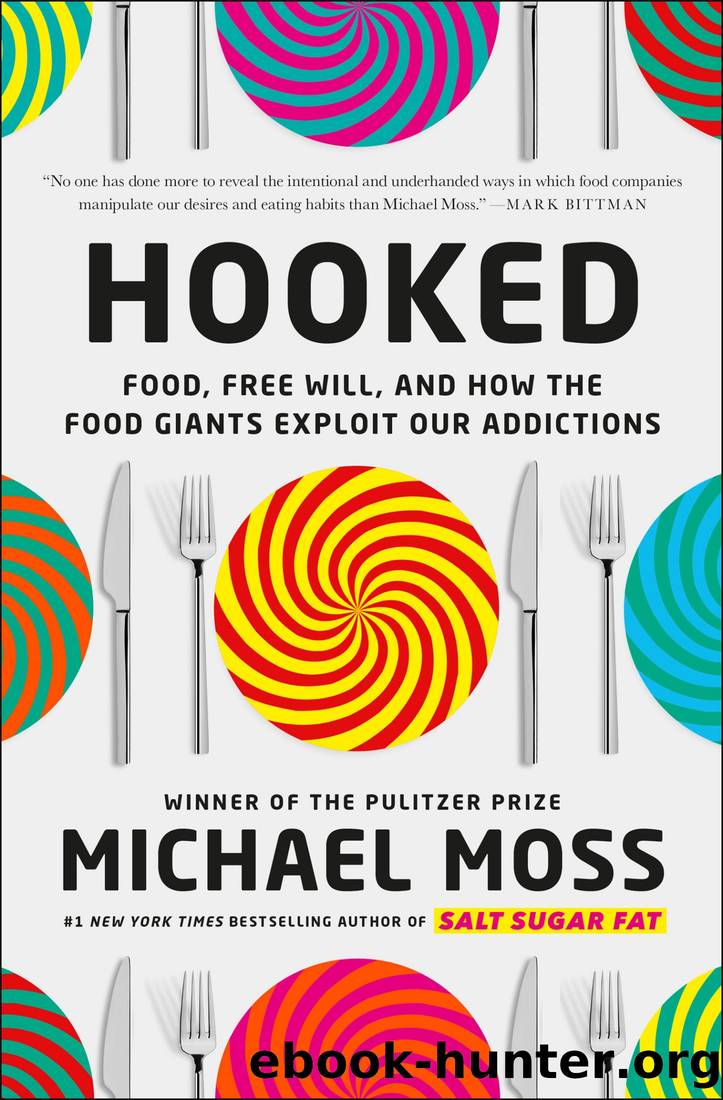Hooked: Food, Free Will, and How the Food Giants Exploit Our Addictions by Michael Moss

Author:Michael Moss [Moss, Michael]
Language: eng
Format: epub
Publisher: Random House Publishing Group
Published: 2021-03-02T00:00:00+00:00
CHAPTER SIX
âShe Is Dangerousâ
The processed food industryâs shrewdness in mining our biology and our emotions enabled it to finesse and take charge of our eating habits. But holding on to that power required something a bit cruder, when a series of events threatened to reveal just how deeply the companies had gotten their hooks into us.
The story of these moves, drawn from interviews and records, paints the picture of a commanding force in our lives going to great lengths to maintain the belief that our disordered eating is on us, through our lack of self-control. And yet, even as the industry and its allies pushed that narrative, some of the strongest dissent to this view has emerged from within the companies themselves. Insiders have sensed there is something dodgy about their products when the most subtle aspects of their design can trip anyone up, willpower or no. This insurgency complicated the industryâs efforts to avoid being held accountable through law and science for our trouble with food.
No one understood this dynamic better than Kraft, whose parent company, Philip Morris, had just been down this same road. For years, the tobacco giant had fended off hundreds of lawsuits by arguing that smoking, however unhealthy, was an expression of free will. Then its own general counsel convinced the board of directors that it would be prudent to make an about-face on this matter, and when Philip Morris, in the fall of 2000, conceded that smoking was in fact addictive, this changed more than the legal landscape on cigarettes. It cast a new light on the threat facing the rest of the companyâs products.
At the time, the larger part of its business wasnât cigarettes; it was processed food. With its mountains of cash from selling tobacco, Philip Morris had not only acquired Kraft in the 1980s but also picked up General Foods, famous for Jell-O and Tang, and then later, in 2000, the cookie and cracker giant Nabisco. These food operations were run from Kraftâs headquarters north of Chicago, and that was where the Philip Morris leadership in New York turned its attention when considering how the companyâs vast lineup of big grocery brands might become the new target of legal raids.
One of these meetings to discuss litigation strategy came on May 24, 2000, three weeks before Philip Morrisâs CEO would tell a jury in Florida how he defined addiction, and the cultural contrast between the tobacco and food managers was on display. They met at Three Lakes Drive, Kraftâs woodsy suburban campus, but the tobacco lawyers stayed at the Four Seasons Hotel in downtown Chicago, where their entertainment that night was a game between rivals: the White Sox and the Yankees.
Already, the tobacco executives had been warning the food-side managers that they could face as much trouble over obesity as tobacco did with cancer, and that they needed to lessen their own dependency on salt, sugar, and fat to make their products low-cost, convenient, and irresistible. But now, with their concession
Download
This site does not store any files on its server. We only index and link to content provided by other sites. Please contact the content providers to delete copyright contents if any and email us, we'll remove relevant links or contents immediately.
Pale Blue Dot by Carl Sagan(4001)
The Rules Do Not Apply by Ariel Levy(3906)
Goodbye Paradise(2964)
Delivering Happiness by Tony Hsieh(2922)
Liar's Poker by Michael Lewis(2812)
Into Thin Air by Jon Krakauer(2701)
Purple Cow by Seth Godin(2698)
Ogilvy on Advertising by David Ogilvy(2682)
Rogue Trader by Leeson Nick(2474)
The Airbnb Story by Leigh Gallagher(2371)
The Social Psychology of Inequality by Unknown(2311)
The Mind Map Book by Tony Buzan(2082)
Six Billion Shoppers by Porter Erisman(2000)
Bossypants by Tina Fey(1987)
All the President's Men by Carl Bernstein & Bob Woodward(1962)
Claridge's: The Cookbook by Nail Martyn & Erickson Meredith(1962)
Master of the Game by Sidney Sheldon(1881)
Alibaba by Duncan Clark(1755)
Wild Ride by Adam Lashinsky(1658)
